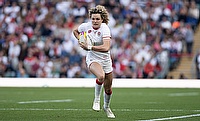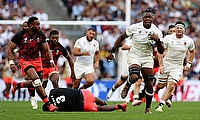Three English rugby union players banned for infringing anti-doping laws
Three English Rugby Union players have been banned ranging from two to 12 years by the UK Anti-Doping (UKAD) for infringing anti-doping laws.
The UKAD has issued an all-sport suspension for the trio.
Kendal Rugby Club-registered player Andrew Quarry has been banned for 12 years on account of three ADRVs, subsequent to a criminal conviction in 2013 for conspiracy to supply a controlled Class C drug.
Quarry was handed a suspended sentence of 12 months' imprisonment by the Carlisle Crown Court in July 2013 after he pleaded guilty to dealing anabolic steroids in a gym.
In an another case, Brandon Walker, who was registered with Esher Rugby Club, tested positive for the anabolic steroid oxandrolone ensuing an out-of-competition squad test in November last year.
The Rugby Football Union (RFU) disciplinary panel enforced a ban from all sport for four years until December 2019 on Walker after he admitted to using the banned substance.
And Connor Stapley, who was registered with Henley Rugby Club, tested positive for the presence of metabolites of the anabolic agents methandienone and mesterolone following an out-of-competition squad test last August.
The RFU disciplinary panel decided that the violation was not intentional after Stapley argued that the positive finding had been caused by a supplement. A review following Stapley's argument provided enough evidence to support his claims. He is banned until September 2017.
UKAD chief executive Nicole Sapstead expressed his satisfaction on the outcome of Quarry case. Sapstead also mentioned that a 'dealer' who made a deliberate decision to cheat the system and law deserved to be removed from the sport.
"It is important to recognise that all three cases are different, must be treated individually and cover a broad range of rule violations.
"The Quarry case is a good result for UKAD and the RFU. Removing a dealer of anabolic steroids from the game - someone who made a conscious choice to cheat the system and the law - is a positive result for the sport.
"The case also shows just how important our relationship with law enforcement has become. By working with local police forces and the National Crime Agency, we have been able to remove a dealer from the system - someone who has absolutely no place in sport."








